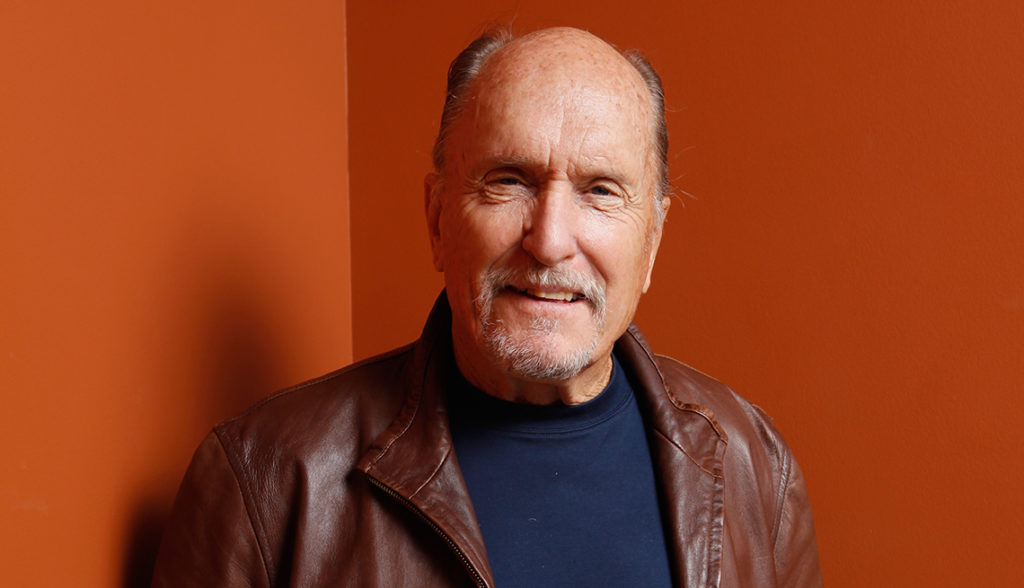American actor Robert Duvall is best known for his role in the 1983 drama movie “Tender Mercies,” for which he received an “Academy Award.” The renowned “National Medal of Arts,” which he got in 2005, is one of his honors.
Robert Duvall’s Age and Parents
William Howard Duvall and Mildred Virginia gave birth to Robert Selden Duvall on January 5, 1931, in San Diego, California, in the United States. His mother was a part-time actress, while his father was an admiral in the US Navy who was born in Virginia.

Robert Duvall’s Education
He attended “Severn School” for his official schooling. In 1953, after earning his degree from “The Principia” in St. Louis, Missouri, he enrolled in “Principia College” in Illinois.
He received training under Sanford Meisner at the “Neighborhood Playhouse School of Theater” in New York from 1955 to 1957. He became friends with Dustin Hoffman and Gene Hackman there.
Robert Duvall’s Career
He began performing professionally in the early 1950s. He performed as a pilot in the theatrical production “Laughter in the Stars,” which was a staging of “The Little Prince.”
He was enrolled to serve in the American Army from 1953 to 1954 for a year. He performed in a non-professional production of the comedy “Room Service” while still in the military.
He returned to theater in 1955 after being released from the military and was given various parts to play. In addition to “Eddie Davis” in Ronald Alexander’s “Time Out for Ginger,” “Hal Carter” in William Inge’s “Picnic,” “Charles Wilder” in John Willard’s “The Cat and the Canary,” “Paris” in Arthur Miller’s “The Crucible,” and “John the Witchboy” in William Berney and Howard Richardson’s “Dark of the Moon,” these roles also included “Paris” and “Paris.”
This rising talent appeared in many theatrical performances in 1956, including John van Druten’s “I Am A Camera,” Inge’s “Bus Stop,” and Frederick Knott’s “Dial M For Murder.”
His acting abilities brought him a lot of fame and additional gigs. He appeared in three plays in 1957: Eddie Carbone in Arthur Miller’s “A View from the Bridge,” Mr. Mayher in Agatha Christie’s “Witness For The Prosecution,” and Hector in Jean Anouilh’s “Thieves’ Carnival.”
He performed not only at the Gateway Theatre but also at the Augusta Civic Theatre, the McLean Theatre, Virginia and the Arena Theatre, and others. He became a notable stage performer after representing several roles.
In 1958, he made his Off-Broadway debut in George Bernard Shaw’s “Mrs. Warren’s Profession,” playing the role of “Frank Gardner.”
His past Off-Broadway productions include William Snyder’s “The Days and Nights of BeeBee Fenstermaker” and Michael Shurtleff’s “Call Me By My Rightful Name.”

As Stanley Kowalski in Tennessee Williams’ “A Streetcar Named Desire,” Maxwell Archer in “Once More With Feeling,” Igor Romanoff in Peter Ustinov’s “Romanoff and Juliet,” and Joe Mancuso in Kyle Crichton’s “The Happiest Millionaire,” he played a variety of lead parts in the year 1959.
He made his television debut in 1959 on “Armstrong Circle Theater,” when he appeared in the episode “The Jailbreak.”
Later, he made frequent appearances in a number of TV episodes, such as “Naked City,” “The Untouchables,” “Route 66,” “The Twilight Zone,” “The Outer Limits,” and “The Fugitive.”
With the release of “To Kill a Mockingbird” in 1962, he made his big-screen debut as his career graph was gradually rising. He appeared in a number of films during the 1960s in modest and significant supporting parts.

He made his Broadway debut in 1966 in Frederick Knott’s “Wait Until Dark” as “Harry Roat, Jr.” The following year, he appeared in David Mamet’s “American Buffalo,” where he played the role of “Walter Cole.”
He quickly rose to fame in the Hollywood film community. Despite having a number of cinematic roles under his belt, the role of “Tom Hagen” in the 1972 picture “The Godfather” was his greatest break. In the 1974 sequel to the movie, he played the part of “Hagen” once again.
Two years later, in the movie “The Eagle Has Landed,” he was featured in a significant supporting role. He had the supporting role of “Lt Colonel” in the 1979 movie “Apocalypse Now,” for which he won a “Golden Globe” award. His other movies from the decade include “The Betsy,” “The Great Santini,” and “Network.”
As a result of winning the “Academy Award” for “Best Actor” for the movie “Tender Mercies,” the actor had a successful period in the 1980s. The Natural and Colors are a few of his other albums from this decade. He also made an appearance in the “Lonesome Dove” miniseries.
Robert made up to 21 film appearances in the 1990s, sometimes serving as the lead of four movies per year. While all of his movies performed well at the box office, “The Apostle,” which was nominated for an “Oscar,” and “A Civil Action,” which won the same prize, were particularly popular.
In addition to performing in movies, he has also been in a lot of television shows, including “Stalin,” for which he won a “Golden Globe” for his performance of Joseph Stalin. In the film “The Man Who Captured Eichmann,” he also portrayed Adolf Eichmann.
He had three movie appearances in 2000: “Gone in 60 Seconds,” “The 6th Day,” and “A Shot at Glory.” In the following years, he could be seen in a variety of films, such as “Assassination Tango,” “Gods and Generals,” “Open Range,” “Four Christmases,” and “Thank You for Smoking,” and “Get Low.”
He played Johnny Crawford in the 2011 film “Seven Days in Utopia.” He had two films come out the following year: “Jayne Mansfield’s Car” and “Jack Reacher.”
He made history in 2014 when his representation of “The Judge” earned him an “Academy Award” nomination for “Best Supporting Actor.” He then made appearances in films like “Wild Horses,” “In Dubious Battle,” and “Widows” in the years that followed.


